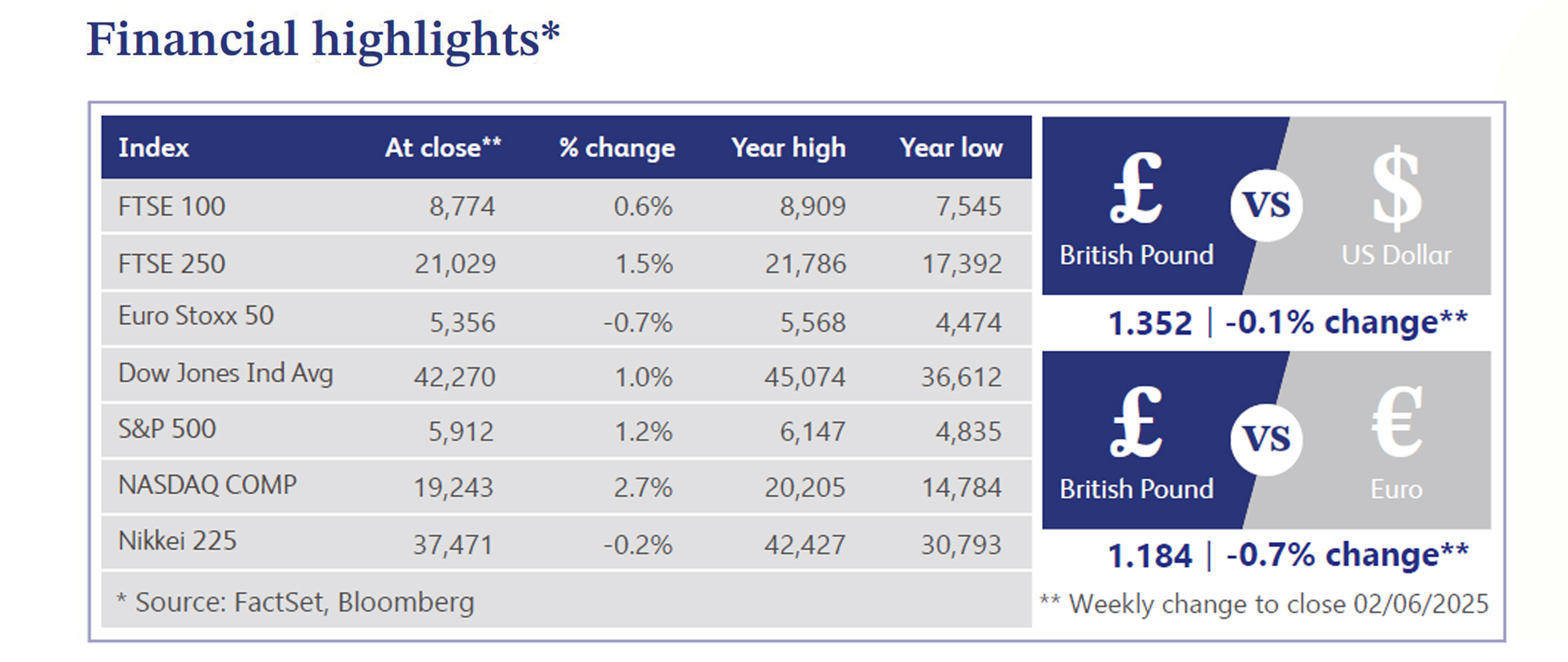
3 June 2025
UK economic data last week highlighted renewed inflation pressures and persistent uncertainty. Food inflation hit a one-year high in May, rising 2.8% year-on-year. Kantar reported that grocery prices surged 4.1%, the highest in 15 months, driven by higher payroll taxes and minimum wage hikes. Business confidence slumped, with Confederation of British Industry (“CBI”) surveys showing sharp declines across services, as firms cited rising employment costs and tax burdens. The Bank of England (“BoE”) Governor, Andrew Bailey, urged caution on rate cuts, citing inflation uncertainty and trade risks, while Monetary Policy Committee (“MPC”) member Alan Taylor advocated for easing due to downside risks. Despite headwinds, Lloyds’ business barometer rebounded to 50%, buoyed by Donald Trump’s softened tariff stance and a US-UK trade deal. However, artificial intelligence (“AI”) disruption concerns mounted, with youth unemployment rising to 12.6%.
Chancellor Rachel Reeves faced rising political and economic challenges, with Labour policy U-turns on welfare increasing the likelihood of a future tax raid, despite pledges not to raise income tax, VAT or employer National Insurance Contributions (“NICs”). The International Monetary Fund (“IMF”) warned that the UK must adhere to fiscal rules to avoid market backlash, though it opened the door to refining those rules for greater stability. Meanwhile, Reeves is in tense negotiations over a £60 billion spending shortfall ahead of the June review, with policing and housing budgets under threat. The UK also sought to advance trade talks with the US to mitigate Trump’s tariffs and support exporters. Separately, new measures were announced to ease planning rules for small housebuilders, though doubts remain over delivery of the 1.5 million homes target.
UK investor confidence surged in May, with Hargreaves Lansdown reporting a 70% rise from April and an 85% jump in economic optimism, driven by improving macro data and the UK-US trade pact. However, structural concerns remain, with Baillie Gifford warning that distrust in initial public offerings (“IPOs”) - damaged by poor 2021 floats - will keep firms private for longer. Meanwhile, the UK government is shifting towards short-term debt issuance to cut interest costs amid waning demand for long gilts. While sentiment has brightened, persistent scepticism in equity markets and rising fiscal risks suggest the recovery in investor confidence may be fragile.
US equities rebounded last week, led by big tech, as Nvidia’s upbeat earnings and strong AI commentary offset lingering trade tensions. The S&P 500 outperformed the equal-weight index by 0.7%, while Treasuries firmed and yields fell. However, volatility in US-China trade relations returned after conflicting court rulings on Trump-era tariffs and signs of stalled bilateral talks. Broader market sentiment was helped by solid economic data, consumer confidence, and GDP saw a slight upward revision. Despite macro tailwinds, underperformance in cyclical sectors and renewed China-tech risks underscored persistent fragility beneath headline strength.
UK housing momentum strengthened in May, with Zoopla reporting the fastest sales pace since 2021. Sales rose 6% year-on-year, while prices grew 1.6%. Zoopla forecasts 5% more sales and 2% price growth in 2025, as resilient demand and buyer confidence support a more active market despite affordability challenges.

M&G, a UK-based asset manager specialising in long-term savings and investment solutions, rose 8.2% after announcing a strategic partnership with Japan’s Dai-ichi Life. The deal will see the insurer acquire a 15% stake in M&G and designate it as its preferred asset management partner in Europe. Chief Executive Officer (“CEO”) Andrea Rossi highlighted the opportunity to scale M&G’s high-alpha strategies and gain access to sticky Japanese capital. With at least $6 billion in anticipated inflows over five years, the move was seen as a strong endorsement of M&G’s global ambitions and strategy execution, lifting shares to a near four-year high.
GSK, a leading pharmaceutical and vaccine manufacturer, gained 5.7% as investors responded positively to its calm stance on looming US tariffs. With a diversified manufacturing base and strong presence in the US market - which generates half its revenue - GSK reassured markets it could weather policy shifts. CEO Emma Walmsley highlighted the company’s resilience at a global health conference, noting its supply chain avoids China and that the group is prepared to mitigate tariff impacts. GSK also reiterated the value of vaccines amid regulatory uncertainty, strengthening investor confidence in its ability to sustain momentum despite geopolitical headwinds.
Auto Trader Group, the UK’s largest online automotive marketplace, slumped 12.6% after reporting a slowdown in revenue growth and continued losses at its vehicle leasing unit, Autorama. Though core retailer revenues rose 7%, overall group growth cooled to 5%, well below the previous year’s 14%. Investors were unsettled by the first-time impact of the UK’s Digital Services Tax and the persistent drag from Autorama. CEO Nathan Coe remained upbeat, citing AI-driven product rollouts and robust demand in a supply-constrained market. However, the market fixated on the slower trajectory and weaker profit dynamics, pushing the stock to a sharp weekly loss.

Market Commentary prepared by Walker Crips Investment Management Limited.
This publication is intended to be Walker Crips Investment Management's own commentary on markets. It is not investment research and should not be construed as an offer or solicitation to buy, sell or trade in any of the investments, sectors or asset classes mentioned. The value of any investment and the income arising from it is not guaranteed and can fall as well as rise, so that you may not get back the amount you originally invested. Past performance is not a reliable indicator of future results. Movements in exchange rates can have an adverse effect on the value, price or income of any non-sterling denominated investment. Nothing in this document constitutes advice to undertake a transaction, and if you require professional advice you should contact your financial adviser or your usual contact at Walker Crips. Walker Crips Investment Management Limited is authorised and regulated by the Financial Conduct Authority (FRN:226344) and is a member of the London Stock Exchange. Registered office: 128 Queen Victoria Street, London, EC4V 4BJ. Registered in England and Wales number 4774117.
Important Note
No news or research content is a recommendation to deal. It is important to remember that the value of investments and the income from them can go down as well as up, so you could get back less than you invest. If you have any doubts about the suitability of any investment for your circumstances, you should contact your financial advisor.